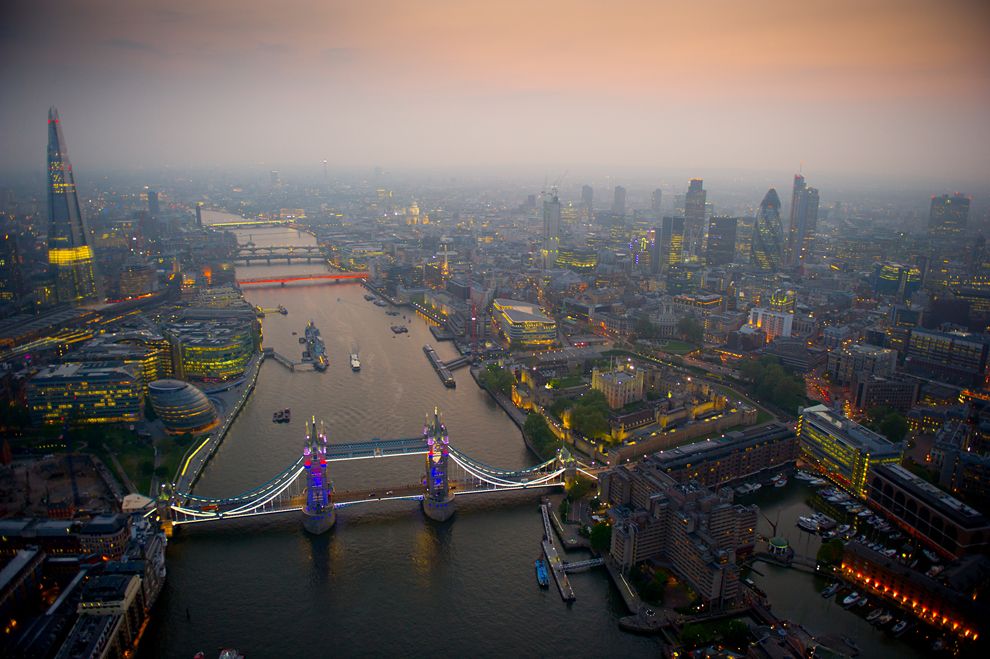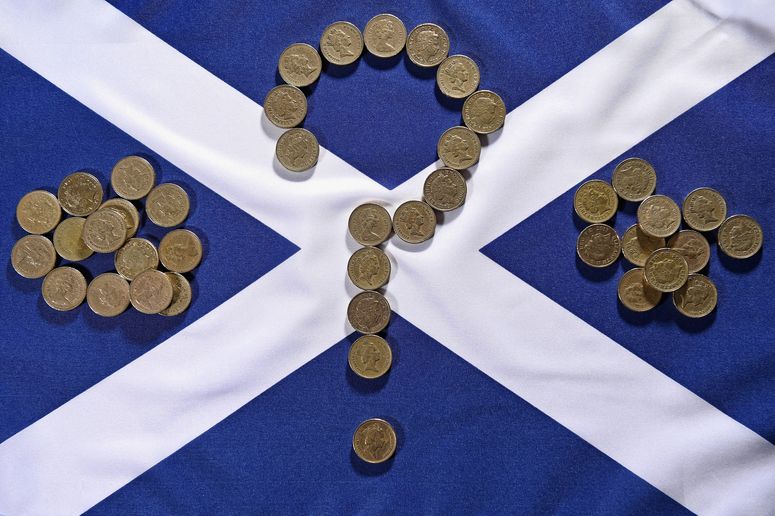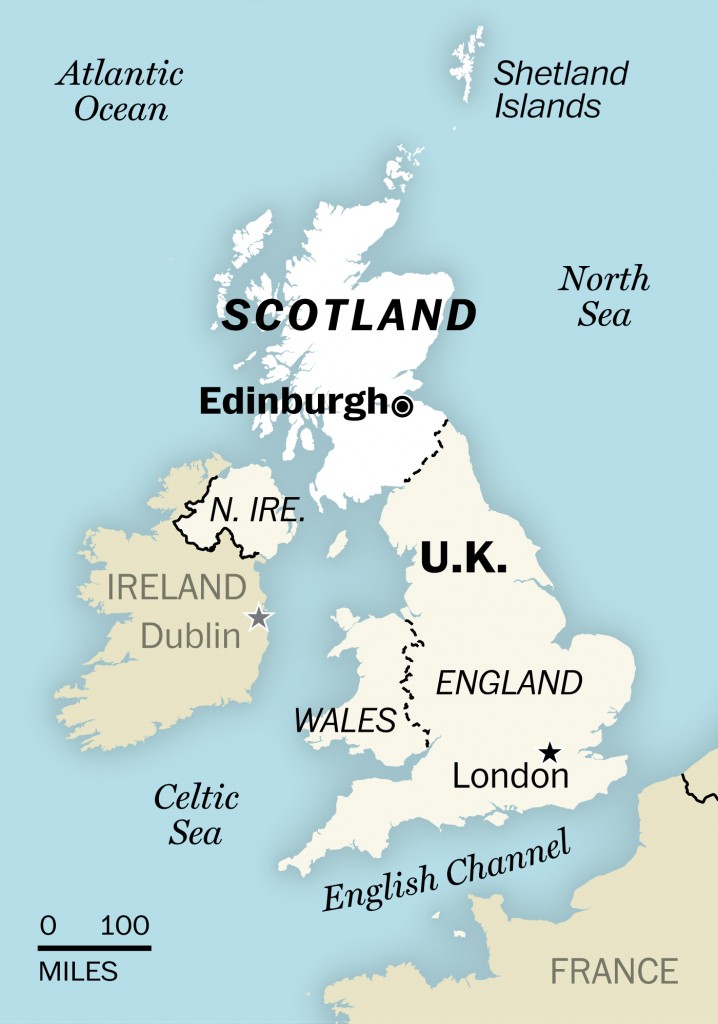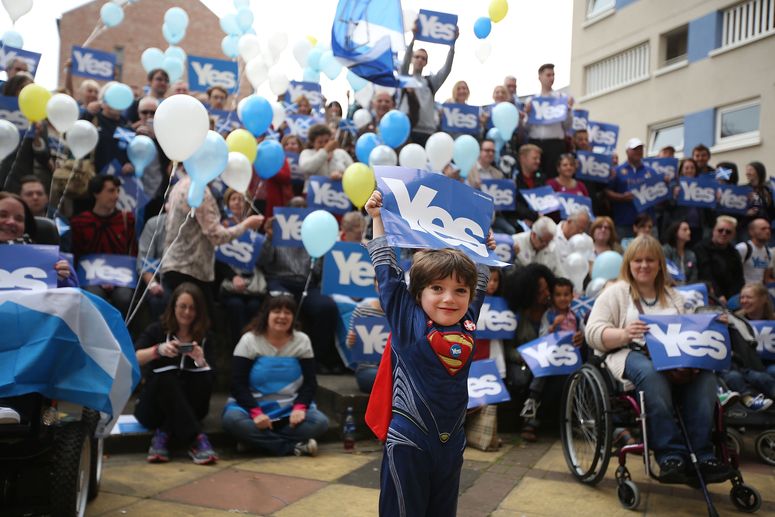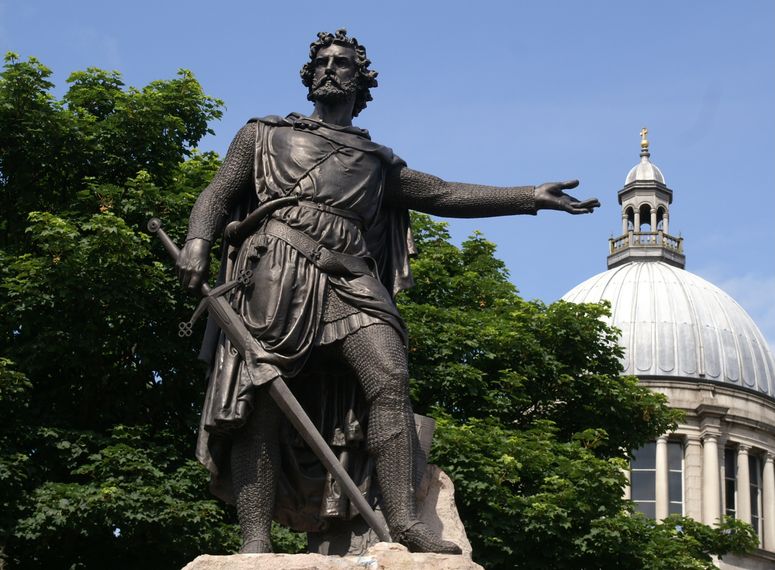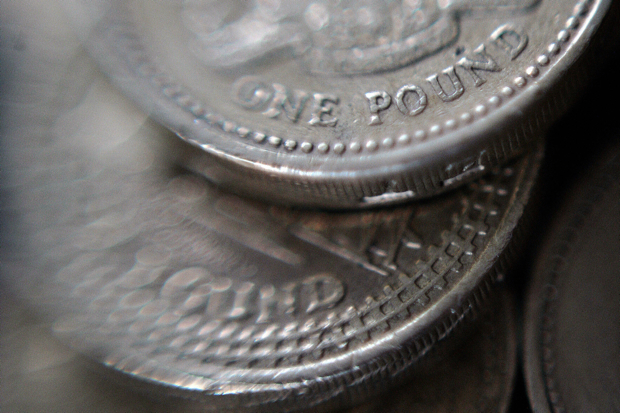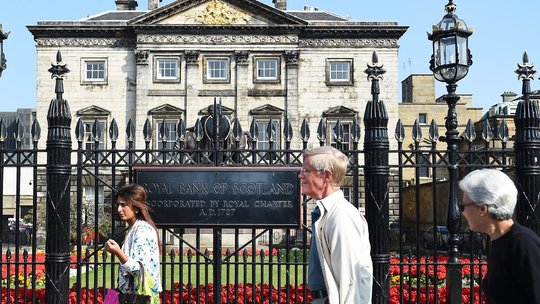Scottish Independence: Answers To Questions You Didn't Know How To Ask
On 18 September 2014, Scots will go to the polls to vote on the future of their country. If a majority of voters check the "yes" box, it will end Scotland's 307-year union with England and Wales as Great Britain — and see it become the world's newest country. But if a majority of them choose "no," then Scotland will remain part of the United Kingdom, along with England, Wales, and Northern Ireland. But why is Scotland even considering independence? What is at stake here? Here's what you need to know.
First and foremost, what will happen to the rest of the United Kingdom (the Great Britain) if Scotland leaves?
It's hard to see it as anything other than a blow. Certainly, if Scots vote to secede on Thursday, Britain will be less great: it will lose 5.3 million residents, more than 8 percent of its population. It would lose the vast majority of North Sea revenue. The U.K. would probably lose a significant chunk of its military power (the independence campaign is asking for a share of assets based on population).
The problems would be deeper than that, however. After more than 300 years of union, Scotland is etched onto the very core of British identity. Even that word "British" indicates the inclusion of the Scottish, who live on the northern part of the island named Britain. Critics have wondered what, exactly, the remaining part of the United Kingdom could be called if Scotland goes it alone: It will no longer be a kingdom that is united, nor will "Great Britain" encompass all of Britain. "Former United Kingdom" has been suggested, though it's hard to imagine that catching on.
washingtonpost.comEven the flag might be up for debate. The current flag for Britain is the Union Jack, which incorporates both the English flag (the red cross of Saint George) with the Scottish flag (the white saltire of Saint Andrew). If Scotland were to leave, logic dictates that the white saltire should go, too. The impact would make itself known in relatively insignificant ways (yet again, no British man would have won the Wimbledon tennis tournament since 1936) to ways that may have a major effect (Britain's left-wing Labor Party may struggle to regain the Scottish MPs it loses).
washingtonpost.comSome proposed redesigns sent to the Flag Institute, a charity, suggested that a red Welsh dragon be superimposed. Welsh people think this is a great idea. But there are only three million of them and their 53 million English counterparts might object. A more subtle approach would be to combine the black-and-yellow flag of the Welsh patron saint, David, with those of England’s St. George and Ireland’s St. Patrick. But if the white-on-blue saltire of Scotland’s St. Andrew is excluded, should the red-on-white saltire of St. Patrick remain nearly a century after Irish Independence — particularly given the resentment it inspires among Ulster unionists?
The most straightforward idea, replacing the flag’s current blue background with a black one, has a catch, too: “That used to be a fascist flag in the U.K.,” said Graham Bartram, of the Flag Institute. “It would be like all those sci-fi movies coming true. I can just see all the soldiers marching in their black uniforms saluting a black flag.” Helpfully, the College of Arms, the official register for coats of arms, has said that the flag would not technically have to be changed if the queen remained the head of state of an independent Scotland.
Okay, so what happens if Scotland wins independence?
Pound coins form a question mark on top of a Scottish flag — are they trying to tell us something?
Image via vox-cdn.comIf the referendum passes, then Scotland will become an independent country "after a process of negotiations." Those negotiations would need to resolve a long list of major issues, including: how much of the UK's national debt Scotland would take on; what currency the new country would use; whether it would be able to join the EU; whether it would be able to join NATO; whether the British Royal Navy would have to remove its Trident nuclear submarines from their current base near Glasgow; whether there would be a closed or open border between England and Scotland; and who would be eligible for Scottish or dual citizenship. And those are just the technical questions — the new government would also need to develop a tax structure, fund its social-welfare platform, and make decisions about immigration and a host of other policy questions.
 vox.com
vox.com
A number of those issues, such as EU and NATO membership, the status of the border, and Scotland's share of the national debt would require consent from the UK and other countries before they could be resolved, and there is no way to be certain how that would go — particularly if tensions with the remainder of the UK spike due to a "yes" vote. There are also areas of economic uncertainty, such as disagreement over how much oil is left in the North Sea reserves and how foreign and domestic businesses would respond to independence. If the referendum fails, then there won't be another independence vote in the near future: the SNP leadership has indicated that it will abandon its push for independence if the referendum backs union with the UK, saying that the vote is a "once-in-a-generation opportunity."
 vox.com
vox.com
So far so good, but can you please go back and explain what really is happening on 18 September 2014?
Some 4 million eligible voters in Scotland are expected to participate in a referendum on one simple question: "Should Scotland be an independent country?" They have only two choices: "Yes" and "No." If a majority choose the latter, it may put to rest the question of independence for some time, but it won't stay calls for further devolution of power from London. If a majority choose "Yes," Scotland would sever its union with Britain. Polls will open at 7 a.m. local time Thursday and will close at 10 p.m. Results will start coming in Thursday night, and there will be a definitive answer by Friday morning.
washingtonpost.comWho can vote?
A young supporter of Scottish independence holds a "yes" campaign sign at a rally in Glasgow, Scotland on September 8th
Image via vox-cdn.comTeenagers! In a compromise struck between Mr. Cameron and Mr. Salmond, the referendum will be open to voters as young as 16, even though the national voting age is 18. Only residents of Scotland can vote. But that has not deterred expatriate Scots or really anybody else from joining the fray. The actors Sean Connery, Brian Cox, Alan Cumming and separatists from Texas to Kurdistan are among those cheering for independence. Mick Jagger, Sting, David Bowie, David Beckham, Pope Francis and President Obama are among those urging Britain to stay together.
What brought them to this point?
The history of Scotland's independence movement is long and complicated. A simple narrative, though, could begin with the tenure of British Prime Minister Margaret Thatcher, who came to power in 1979. The privatization measures enacted by the conservative premier, as WorldViews discussed here, hollowed out Scotland's industrial base, eroded its labor unions and unraveled its social contract. Scotland was treated as something of a petri dish for Thatcherist policies; the implementation of a controversial new British taxation system in Scotland in 1989 as an experiment was the "most egregious decision," suggests the Guardian.
washingtonpost.comIn the years since, Scotland became a political wasteland for British conservatism. In the vacuum, the Scottish National Party found new life, led by the controversial populist Alex Salmond. As we've explained before, Salmond positioned the SNP in the 1990s as a social democratic, European-friendly party that happened to also favor freedom from Britain. In 1999, it won greater devolution from London, which allowed the formation of a Scottish parliament. From there, Salmond's SNP steadily gained in political clout, winning the support of many Scots who had become disillusioned with the neo-liberalism of the Labor government of Prime Minister Tony Blair. By 2011, the SNP had an outright majority in the Scottish parliament, and, the following year, it won agreement from the coalition government of conservative British Prime Minister David Cameron to stage the upcoming referendum on independence.
washingtonpost.comWill Scotland keep the pound?
An independent Scotland would keep the British pound as its currency, the SNP says. No, they would not, the British government replies. It's a clear divide between the "yes" and "no" camps. For what it's worth, Salmond has argued that it doesn't really matter what London thinks. "No one can stop us from using" it, he told Sky News this week.
He's not wrong, but there may be complications. The independence movement has suggested that it would seek a currency union with the United Kingdom, but the powers in London would have to agree to that. Should they refuse, Scotland could unofficially use the pound anyway, in the manner that Ecuador uses the U.S. dollar.
washingtonpost.comOkay, but why does any of this matter?
Sure, Britain is a slowly diminishing world power, and Scotland, at least in terms of population, is only a small part of it. But a vote for independence has many implications beyond the dramatic sundering of Britain. The SNP has said that an independent Scotland would be totally free of nuclear weapons currently kept in its territory and waters.
That raises real headaches for London, which anchors its "Trident" system, a number of nuclear-armed submarines, in Scotland's Firth of Clyde. Scotland's independence campaigners believe their disavowal of nuclear weapons would be consistent with their future obligations as a NATO state.
washingtonpost.comIts independence would also buoy secessionist movements elsewhere, particularly in other restive corners of Europe. Campaigners in the northeastern Spanish region of Catalonia have specifically pointed to the success of the SNP and the process that led to this referendum as a model to be replicated. A pro-independence protest in Barcelona last week drew as many as 1.8 million supporters.
Both Scotland and Catalonia's independence movements champion their respective regions' roles in a wider Europe and see their independent states as cosmopolitan and open to immigrants. It's a far cry from the ethnic nationalism that reshaped Europe's map a century ago. At a time when many pundits wring their hands over the future of the world order and the fundamental flaws of our traditional nation-state system, these small struggles offer an interesting insight into where global politics may be heading.
washingtonpost.com